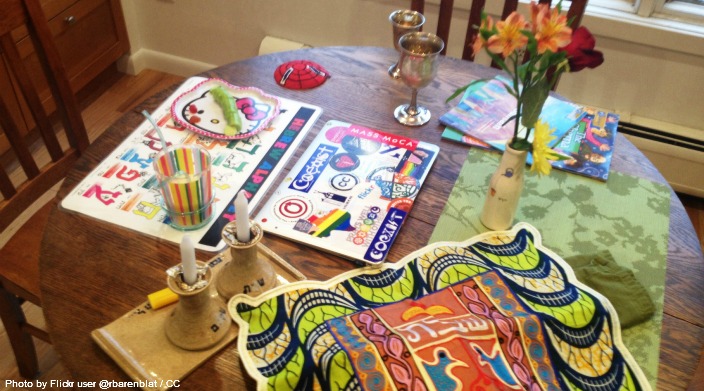
When my son Sammy was in preschool, Shabbat was magical. On Friday afternoons, he and I baked challah together. In the evenings, we gathered as a family, sat at a nicely set table, and said the prayers. Following the blessing for boys, my husband and I each whispered a special message in Sammy’s ear, and we shared with each other our favorite part of the week.
But Sammy is now 10, and as he has gotten older, our lives have become busier with work and after-school activities – and Shabbat has lost some of its glow.
Our once carefully set table now looks like the same one we eat at every weeknight: papers and magazines are pushed to a corner, and nondescript place mats and napkins decorate the surface. The only hint of Shabbat’s presence is the candles, challah plate, and Kiddush cup squished into the available space.
Our challah is store-bought, and my men, who are starving and a little grumpy, request the fast version of the blessings. A new ritual – Sammy chasing the dog around the family room so that he, too, can receive the blessing for male children – has replaced the sweet whisper. When the chase is finally over, he brings the growling dog to the table to be blessed. Apparently, the dog enjoys this routine – at least that’s what Sammy says.
Because our Shabbat practice no longer seems special, it would be easy for us to give into our hectic schedule, to say we can’t celebrate, to abandon our flawed observance. But each week, we find ourselves back at the table, ready to try again.
Over time, we’ve realized that Shabbat’s magic hasn’t disappeared; it has simply changed. The enchanted evenings are gone, but in their place are small but extraordinary moments.
There are long discussions about the week’s Torah portion that encourage us to talk about life, politics, history, sports, and a host of other subjects. These dialogues don’t happen every week, but when they do, Sammy often says, “Don’t you just love it when this happens, when the conversation twists and turns and you can’t figure out how you got from one point to the other, but somehow everything seems to connect?” This is the power of Shabbat.
On other Friday nights, there are walks after dinner. Our dog enjoys these moments so much that he runs, prances, and leaps through the grass at the park, happy to be with his family. This is Shabbat, too.
Sometimes, we find togetherness playing family board games or sitting by a fire. At other times, it is not until we sing Hashkiveinu as we all snuggle close in Sammy’s bed before he goes to sleep that we get that Shabbat feeling.
It is through these experiences that we now find Shabbat – extraordinary moments nestled inside ordinary ones. Discovering them required our full attention and the regular practice of an imperfect ritual. If we said, “we can’t” or “we’re too busy,” or if we were only focused on the big picture, we might have missed them.
Related Posts

Harnessing the Power of our Mothers Around the Seder Table

Melding Tradition and Innovation: Our Interfaith Toddler Naming Ceremony


